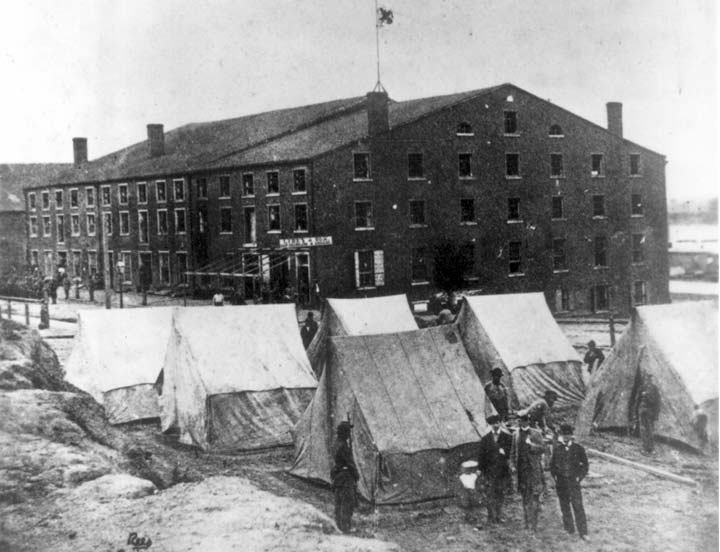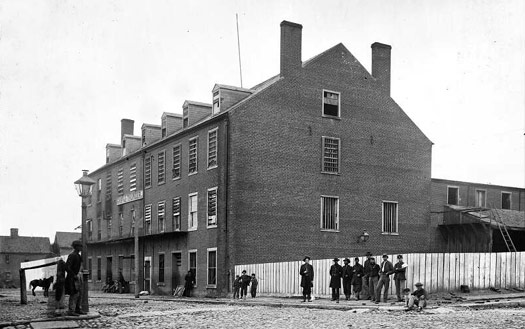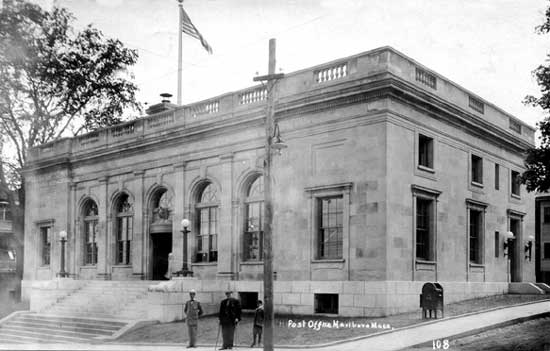Back in Camp
May 8th - June 11th, 1863
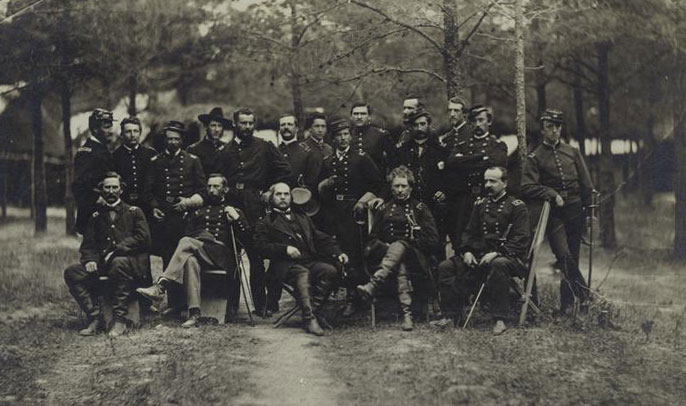
General Joe Hooker and Staff, June, 1863.
[Officers Standing]
1) Captain C. B.
Comstock; 2) Captain J. B. Howard;
3) Lt.-Col. N.H. Davis; 4) no name
listed; 5) Captain D. W. Flagler; 6) Captain J.R.
Coxe; 7) no name listed; 8)
Major W. H. Lawrence; 9) Lieutenant J. C. Bates;
10) Lieutenant F. Rosencrantz;
11) no name listed; 12) Captain Ulric Dahlgren;
13) Lt.-Col. Joseph Dickinson; 14)
Lieutenant Charles E. Cadwalader.
[Seated]
Colonel H. F. Clark; General
H.J. Hunt; General Rufus Ingalls; General Joseph
Hooker; General Daniel
Butterfield.
A SPECIAL THANK YOU to JEFFREY BRIDGERS at the LIBRARY OF CONGRESS who answered several e-mail inquiries regarding the identities of the men in this photo, and other questions about the civil war sketches of Edwin Forbes, and Alfred R. Waud.
- Introduction - What's on this Page
- Back In Camp May 9 - 17
- Change of Camp; Change of Brigade
- Letters Home; Edwin Field and Charles Adams
- Major Gould's Speech & General Reynold's Review
- JUNE, 1863
- "Libby Prison" by John S. Fay
Introduction - What's on this Page
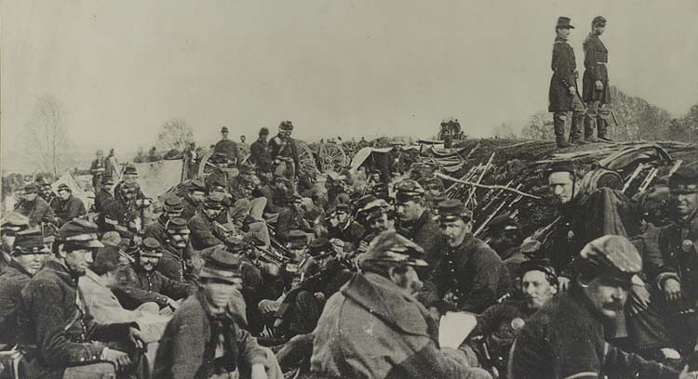
"Union Soldiers entrenched along the west bank of the Rappahannock River at Fredericksburg, Virginia." Photographed by Andrew J. Russell, between April 29 and May 2, 1863. Formerly misidentified with the title "Union Soldiers in Trenches before Petersburg, Dec. 1864."
The Most Serious Setback of the War
Chancellorsville was the bloodiest battle of the war to date with 17,000 Union casualties. On May 6 General Hooker telegraphed President Lincoln that he had re-crossed the Rappahannock. That afternoon, Lincoln and General-in-Chief Henry Halleck left Washington to visit Hooker and check on the condition of the Army of the Potomac. Corps commanders were gathered together to discuss the morale of the troops. Reasons for the retreat were excluded from the conversations. “Lincoln told them he feared that the effect of the defeat at home and abroad would be more serious than any other setback of the war.”1 The President returned to Washington the next day but instructed Halleck to stay and learn all he could. On May 7th Lincoln wrote Hooker to ask if another move might be made while the enemy’s communications were still disrupted, (a result of General Stoneman’s Cavalry raid behind Confederate lines). Hooker’s reply suggested he had ideas and was planning, a move "in which the operations of all the corps, unless it will be a part of the cavalry, will be within my personal supervision.”
General Halleck returned to Washington and reported that the corps commanders blamed Hooker and his “inexcusable” actions for the defeat at Chancellorsville. Most of them wanted Hooker replaced. Lincoln decided to be patient in the matter. The President and the General met on May 13th when Hooker announced he was ready to make a new move on the morrow. In preparation for this un-named move, the camps of the First Corps were moved closer to the Rappahannock.
Lincoln discouraged the plan and expressed the opinion that the window of opportunity had passed away; - the enemy had time to restore its communications, “regain his positions and actually receive re-inforcements. It does not now appear probable to me that you can gain any thing by an early renewal of the attempt to cross the Rappahannock.” He also warned Hooker, “some of your corps and division commanders are not giving you their entire confidence.”2 The un-named move did not happen. Another problem with the Army of the Potomac which delayed Hooker’s plans was the loss of 23,000 two years and 9 months men, whose term of enlistment expired between late April and mid June.
To compensate for the loss, divisions and brigades were consolidated. The 3rd Brigade was eliminated and the '13th Mass.' were put into the 1st Brigade of their Division. Union artillery was also reorganized to increase effectiveness. Artillery brigades were detached from infantry divisions and one each assigned to the various corps. Five brigades were grouped into the artillery reserve. Ammunition trains were placed in command of artillery officers rather than infantry quartermasters.3 Efficiency increased. General Lee also re-organized his army.
He formed his Confederate troops into 3 corps with 3 divisions each and re-grouped his artillery. With the admirable success at Chancellorsville, Lee's thoughts returned to planning an invasion of the north.
Confederate Concerns Bear a Daring Strategy
General U.S. Grant’s Vicksburg campaign met with great success in May, 1863. Grant cut his army off from a supply base, and moved behind Vicksburg to attack the city fortress from the rear. He captured Raymond, Mississippi May 12, and Jackson, Mississippi May 14. Then he turned his force west. He battled Confederates away from Champion Hill May 16, Big Black River May 17, and pushed on to Vicksburg. Two bloody frontal assaults failed to break through Confederate defenses, May 19 & 22, so Grant settled in for a siege.
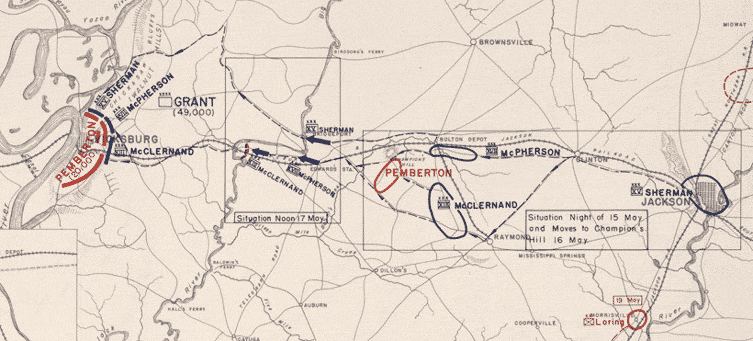 Map of Grant's
Vicksburg Campaign, May 15 - 19, 1863
Map of Grant's
Vicksburg Campaign, May 15 - 19, 1863
Jefferson Davis wanted to send troops from Lee’s army to bolster beleaguered Confederates in the west. General Lee convinced Davis he had a better plan. Lee preferred an offensive campaign in the North, to terrorize the northern people, strike the Army of the Potomac along the way, increase anti-war sentiment already on the rise, and force the Lincoln administration to recognize the Confederacy.
Anti-war Sentiment in the North
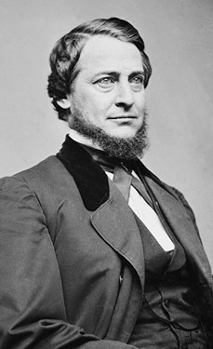
Successive Union defeats in the East, gave voice to political opponents of the Lincoln Government. Clement L. Vallandigham representative from Ohio, was a leading spokesman for the Peace Democrats, nicknamed Copperheads. In January following the Emancipation Proclamation he spoke in the House of Representatives on “his favorite themes: that the South could never be defeated, and the war had only produced “defeat, debt, taxation, sepulchers…the suspension of habeas corpus, the violation …of freedom of the press and of speech…which have made this country one of the worst despotisms on earth.” 4 He urged, “stop fighting, Make an armistice.” His speech was cheered.
He gave a similar speech in Ohio when home on recess, campaigning for the Democratic Gubanatorial Nomination of that state. General Ambrose Burnside, in command of the Military Department of Ohio, had proclaimed that, "The habit of delaring sympathy for the enemy will not be allowed in this department." Vallandigham was baiting Burnside. Shortly after giving the speech he was promptly arrested for treason and a military trial sentenced him to imprisonment for the remainder of the war. The arrest caused Lincoln considerable problems. Throughout May and June, Democrats protested Vallandigham’s incarceration with petitions and large rallies in Ohio, Pennsylvania, New Jersey and New York. Considering the situation, Lincoln decided to exile Vallandigham to the Confederacy, rather than imprison him at Fort Warren in Massachusetts Bay. He was handed over to Confederate authorities in Tennessee on May 25th. Lincoln addressed the matter in a June 12 letter:
“Ours is a case of rebellion in fact, …a clear, flagrant, and gigantic case of rebellion; and the provision of the Constitution that “the privilege of the writ of habeas corpus shall not be suspended, unless when, in cases of rebellion or invasion, the public safety may require it,” is the provision which specifically applied to our present case.” This provision plainly attests the under standing of those who made the Constitution, that ordinary courts of justice are inadequate to “cases of rebellion.” Mr Vallandigham avows his hostility to the War on the part of the Union; and his arrest was made because he was laboring, with some effect, to prevent the raising of troops; to encourage desertions from the army; and to leave the Rebellion without an adequate military force to suppress it. He was not arrested because he was damaging the political prospects of the Administration, or the personal interests of the Commanding General, but because he was damaging the Army, upon the existence and vigor of which the life of the Nation depends. He was warring upon the military, and this gave the Military constitutional jurisdiction to lay hands on him.” 5
On June 3rd,
Democrats led by New York
Mayor Fernando Wood met at the Cooper Institute and urged peace.
The
same day Lee began his advance.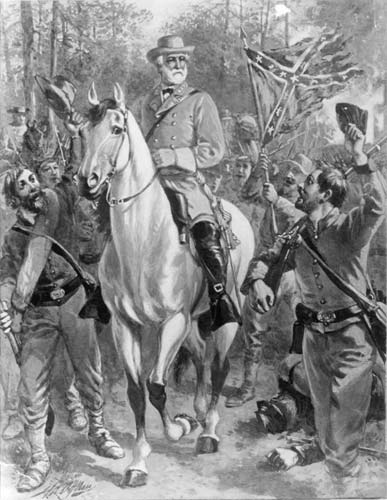
Once the Confederate authorities approved his invasion, Lee re-enforced his army. He asked to recall the men Jeff Davis had earlier detached for duty further south. After some negotiations, Lee got several of his veterans back, but not all. Some untried troops re-filled his ranks. His army numbered 75,000 men. On June 3rd he sent a division west to Culpeper and kicked off his campaign. He continued funneling troops west each successive day.
Lee wanted to make the first move before Hooker, and he did.
June; Hooker Considers a Thrust SouthIn late May & early June, low water levels in the Rappahannock made it crossable in several places and less of a protective barrier between the two armies. On June 3rd the 5th Corps was directed to re-enforce the guard at Banks Ford. Then, June 4th, when Hooker became aware of Lee’s activity he ordered the 2nd, 11th, and 12th Corps to be ready to move. Cavalry was ordered out toward Culpeper.6
On June 5th, knowing Lee was shifting troops west he established a bridgehead at Franklin’s Crossing to determine Rebel strength on the opposite side. Federal Artillery blasted away at Rebel rifle pits to cover the bridge building and crossing. The bombardment temporarily halted Confederate General Ewell’s march to Culpeper. In the morning Hooker proposed to President Lincoln another plan to cross the river and pitch into the rear of Lee’s departing army. President Lincoln promptly replied:
“I have but one idea which I think worth suggesting to you, and that is in case you find Lee coming to the north of the Rappahannock, I would by no means cross to the South of it. If he should leave a rear force at Fredericksburg, tempting you to fall upon it, it would fight in intrenchments, and have you at disadvantage, and so, man for man, worst you at that point, while his main force would in some way be getting an advantage of you Northward. In one word, I would not take any risk of being entangled upon the river, like an ox jumped half over a fence, and liable to be torn by dogs, front and rear, without a fair chance to gore one way or kick the other.”7
Hooker persisted and for the next 5 days continued exploring the possibilities for an aggressive crossing en masse.
On June 6th
Hooker ordered the 6th
Corps to throw a force, the entire corps if necessary, across the river
at Franklin's Crossing, to test
the enemy’s strength. It didn’t take long
to find the enemy concentrated in front.
“It is not safe to mass troops on this side,” was the report
received
at
headquarters.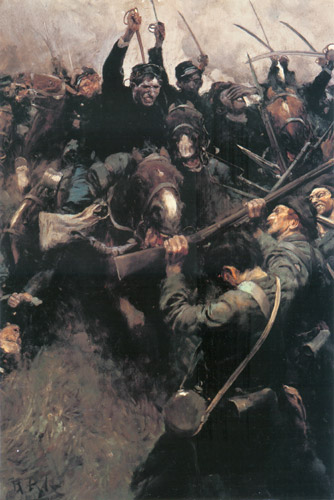
On the 7th, thinking Lee was planning a raid around his lines, similar to that of August 1862, Hooker ordered a large cavalry force with infantry supports west, to fall on the Confederate Cavalry near Culpeper, and destroy them.
On the 8th he requested a topographic study of Rebel defenses along the river at some of the nearby river crossings. Meanwhile, - his cavalry & infantry expedition surprised Confederate Cavalry at Brandy Station, and a sanguinary fight ensued. For the first time in the war, the Union Cavalry performed on a par with its Confederate counterpart. The fight was inconclusive but the Confederates received a good drubbing.
By June 10, two of Lee’s three corps had shifted to Culpeper with one remaining behind at Fredericksburg. Again, General Hooker wrote to President Lincoln and proposed a major thrust across the Rappahannock to compel the enemy to abandon its present position around Fredericksburg. The Federal force would then rapidly advance to Richmond and give the Rebellion a mortal blow. Lincoln and General in Chief Henry Halleck quickly said no. Lincoln in part replied,
“I think Lee’s Army and not Richmond, is your true objective point. If he comes toward the Upper Potomac, follow on his flank, and on the inside track, shortening your lines, whilst he lengthens his. Fight him when opportunity offers. If he stays where he is, fret him, and fret him.”
With his plans for a move south rejected and with Lee’s infantry moving northwest, Hooker shifted his army to meet potential enemy threats on his flank. On June 11th, dispatches were made accordingly, and the First Corps ordered to march the next day to Berea Church.
FOOTNOTES
1. “Chancellorsville 1863; The
Souls of the Brave” by Ernest B. Furgurson,
Vintage Civil War Library Edition, 1993. p. 331.
2.
“Abraham Lincoln, Speeches and Writings;” Library of America,
1989. p. 447, Lincoln to Hooker, May 14, 1863.
3. “The Gettysburg Campaign, A
Study in Command;” Edwin B.
Coddington, Touchstone Edition, 1997. p. 40 - 41.
4. “The Unpopular Mr. Lincoln,”
Larry Tagg, Savas Beatie; 2009. p. 365.
5. “Abraham Lincoln, Speeches
and Writings;” Library of America,
1989. p. 454, Lincoln to Erastus Corning and Others, June 12,
1863.
6. “Franklin’s
Crossing, June 1863”; & “Third
Fredericksburg,” part 2; Noel Harrison; articles on
the blog, “Mysteries & Conundrums” August 1,
2011 &
September 9, 2013 respectively.
7. “Abraham Lincoln,
Speeches
and Writings;” Library of America,
1989. p. 451-2, Lincoln to Hooker, June 5,
1863.
OTHER SOURCES:
The Civil War Day by Day, An Almanac 1861
– 1865; E.B. Long with
Barbara Long; Da Capo, 1971.
Hooker's actions between June 5 &
10 relly upon Noel Harrison's articles referenced in note #
6.
What's On This Page
Considering the hullaballoo at Headquarters, Washington, and elsewhere, things were very quiet in the camp of the '13th Mass.' at this time. The return to camp life brought the usual return to picket duty, guard duty, inspections and drills. Most of the soldiers' letters and diaries throughout this page comment on the same. Sergeant George Hill opens the page with a letter expressing his disappointment with Hooker just after the retreat from Chancellorsville. Charles Davis summarizes the return to camp life whille a new campaign is planned. Soldiers record the weather turned hot. Warren Freeman & Edwin Field describe the new camp site. Field also comments on the departure of the two years and 9 mos men, and, Governor Andrew of Massachusetts, is raising another Black Regiment, the '55th', in which some members of the 13th were appointed officers. Feeling qualified for an officer's commission himself, he laments the influence required to obtain one. The Review by Gen.Reynolds, May 30, is recorded by Sam Webster and John Bowdwin in their diaries, but no details are given. Politicians investigating the latest military debacle of Chancellorsville visited camp and Charles Adams writes that Senator Henry Wilson of Natick visits the Company H boys from his hometown. Major J. P. Gould prepares to leave the regiment for special duty in Boston, and makes a noble speech that gets picked up in the papers. Warren Freeman gives a number to the men left in the regiment and his company. He also notes the 6th Corps has once again crossed the river. Sam Webster climbs a tree to see what is going on the other side. The frequent orders to march are recorded by Boudwin. The page ends with the incredible 'must-read' memoir of John S. Fay who was struck by a shell April 30. His field hospital was abandoned when the army moved north in June. It was captured by Rebels and Fay, recovering from two amputations was sent with others, to Libby Prison in Richmond. Surgeon Allston W. Whitney of the 13th figures prominently in the story. He describes his ordeal in detail.
PICTURE CREDITS: All images & Maps are from the Library of Congress digital images collection, with the following exceptions: General Hooker and Staff is from the NY Public Library Digital Collections; Howard Pyle's, "The Charge," 1904, from "History and Romance, Works by Howard Pyle From the Brokaw Family Collection"; Brandywine River Museum, 1998; Captain Pierce's kepi is from the "Echoes of Glory" series of Time-Life Books, p. 178; (photo taken by Larry Sherer, assisted by Andrew Patilla); Captain Joe Cary & Priv. Chandler Robbins, are from the Army Heritage Education Center's Civil War Photograph Collection, (Carlisle, PA) photographed by Brad Forbush; Major Gould, and Sergeant Sigourney Wales, are also from Carlisle, Mass MOLLUS collection; Private Edwin Field from Scott Hann; Charles N. W. Cunningham & Charly Drew, both of Company A, from Tim Sewell; Libby Prison, Elizabeth Van Lew, and Richard Turner from Mike Gorman's website "Civil War Richmond;" www.mdgorman.com; The Marlboro, Mass., Post Office from the Marlboro Historical Society; ALL IMAGES have been edited in photoshop.
Back In Camp May 9 - 17
Letter of George Henry Hill, May 9th 1863
On May 5th a tired but confident soldier, George Hill, wrote from the battlefield trenches:
"Thus far everything is in our favor and we have confidence that we are to win this fight in such a manner as will allow no doubt of it. ...I shall not send this to day and possibly may have something to add."
A few days later, now, obviously dejected, George finished his letter.
Friday May 9
Again we have retreated, To continue the account where I left it. We remained in our trenches until Wednesday night when we recrossed the river and we are now camped about 6 miles below Falmouth. Where we go next of course I cannot tell. I am
(7)
disappointed enough for I was so confident of success. I have still every confidence in Hooker but he was a little too ambitious. The enemy suffered much more than we did in killed and wounded and if Sedgwick had held the Heights of Fredericksburg our victory would have been complete. Wednesday a terrific storm came on but whether that or some movements of the enemy caused our return to this side I know not.
I have not seen a paper for a fortnight. I am anxious to know what is going on in other parts of the country. God grant that something is being accomplished.
I am well but pretty much
(8)
played out, for until last night I have not had a full nights sleep for 11 days.
Love to all.
I will write again as soon as anything occurs.
Excuse Haste fromAfffc Son
Geo H
George is correct about Sedgwick holding the Heights of Fredericksburg, and the thought may have occurred to General Sedgwick at some point, but he was under orders from Hooker to make haste towards Chancellorsville. Hooker did nothing to help out Sedgwic's troops when they were attacked by the enemy in force at Salem Church. The faillure of the campaign, although George Hill could not have known it when he wrote this, was with General Hooker, who lost his resolve in mid-campaign.
The following narrative is taken from the regimental history, "Three Years in the Army," by Charles E. Davis, Jr.; Boston, Estes & Lauriat; 1894. (p 211 - 212).
We remained in camp in this vicinity until June 12. During this time the regiment was engaged in the usual camp routine of drills, reviews, inspection, and parades, beside doing our share of the picket duty along the north bank of the Rappahannock River, the enemy’s pickets being on the south bank, within easy hearing distance.
On the 21st of May the regiment was transferred from the third to the second brigade* in the same division under command of General Robinson ; General Reynolds continuing in command of the First Army Corps. Our associates in the second brigade were the One Hundred and Fourth New York, the Sixteenth Maine, and the One Hundred and Seventh Pennsylvania regiments. The Eleventh Pennsylvania was subsequently transferred to the same brigade, to our very great pleasure.
All this time active preparations were being made for another campaign, while we freely discussed the competency of generals, planned campaigns, and patiently waited for an order from Washington to take command of the army. As time rolled on, and the price of recruits advanced, we learned that the Government felt that we were doing too good a service in the ranks to be transferred to the head of an army. The wishes of the Government were not to be lightly set aside, so we continued to tote a knapsack and gun, though we yearned occasionally for the comfortable quarters of a major-general.
So much complaint was made about carrying out the order of March 21st, respecting the wearing of badges, that on the 12th of May General Hooker issued an order containing the following paragraphs:
"The badges worn by the troops, when lost or torn off, must be immediately replaced. Provost marshals will arrest as stragglers all other troops (but those designated as being without badges) found without badges, and return them to their commander under guard."
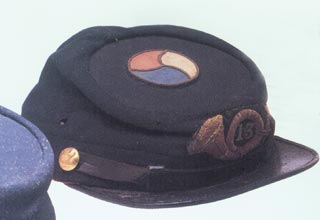 From this time on the corps
badge was universally worn, and
proved a great convenience, besides exciting a feeling of pride among
the men.
From this time on the corps
badge was universally worn, and
proved a great convenience, besides exciting a feeling of pride among
the men.
From time to time fears were entertained at headquarters that the enemy were intending to cross the river, and orders were received to move, but were countermanded in season to prevent us from marching.
We received about this time a lot of books and pamphlets from home, collected by some kind friends who were not forgetful of our wants. They afforded us a good deal of pleasure, and helped to wear away the depression that we shared in common with the rest of the army at our recent defeats.
[Pictured is the kepi of Captain Elliot C. Pierce of the '13th Mass.' Recently commissioned captain to the Ambulance Corps of the First Army, his circular badge is red, white & blue, representing the 3 Divisions of the First Corps. - "From Echoes of Glory, Arms & Equipment of the Union;" Time-Life Books].
*NOTE: Davis has made a mistake, the Regiment was transferred to the First Brigade, of General Robinson's Second Division.
Diary of Sergeant John Boudwin, Company A
From
the
collection of the Pearce Museum, Navarro College, Texas.
John Boudwin's diary continues to
chronicle the
routine of camp life.
May 8. Cloudy. Cleaned our rifles and clothes and they were in need very much. Laid in the woods all day.
May 9. Pleasant. Had Inspection of arms & equipment. Received rations of Beans Coffee & Sugar.
Sunday,
May
10.
Pleasant. Have
our regular Sunday Inspection of
arms and Clothing.
May 11. Very warm. Went down to brook and had a good Bath. Eve. Dress Parade.
May 12. Pleasant & Very Warm. Company Drill in the morning. Eve. Dress Parade.
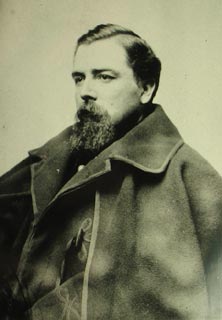 May
13.
Pleasant.
The regiment went on
picket. Eve. shower of rain.
May
13.
Pleasant.
The regiment went on
picket. Eve. shower of rain.
May 14. Pleasant. Drew Clothing. Afternoon Heavy shower.
May 15. Pleasant. At 3/30 Was woke up from our peacefull slumbers by the orders to march. Cooked some coffee and at 6 AM the order was countermanded. After noon Capt Cary [pictured]* from Boston arrived in Camp looking well.
May 16. Pleasant. At 6 AM we went out to drill and stayed till 8. I drilled the Company in the Bayonet Excercise. Afternoon went down and had a bath with Mess Mate Charly Cunningham. Had dress parade and a very poor one under Major Gould.
Sunday,
May
17.
Pleasant.
Had Regimental Instruction. Dress Parade
finished the days work.
NOTE: *Captain Joe Cary of Company B, was granted a 20 day leave of absence December 20th, 1862. This was extended another 30 days in January, 1863. Cary was reported invalided in Boston from the result of chronic dysentery. He mustered out of the service Feb. 28, 1863. The Custom House in Boston where Cary was now employed, provided jobs for many of Boston's veterans after their service. The objective of his visit to the regiment is unknown, but his two brothers William & Sam, were still active officers in the '13th Mass." William was Captain of Co. G at this time, and Sam, 2nd Lt., Co. F.
Return to Top of Page
Change of Camp; Change of Brigade
Letter of Warren Freeman, Company A
Warren's letters were published privately by his father in 1871; "Letters From Two Brothers Serving in the War for the Union;" Riverside, Cambridge: Printed by H. O. Houghton and Company.
In Camp Near Fitz-Hugh Mansion, Va., May 18, 1863.
Dear Father, - I am in receipt of none of your favors since I received yours of May 2nd. I do not know the reason, but suppose they may be detained on the road; I shall expect one or two letters from home in to-night’s mails sure. I have recently received a letter from Aunt Hettie, dated Madison, May 4th; she and Uncle Samuel are well.
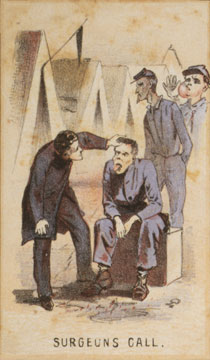 We
now have a nice camp in a pine grove, which makes it quite
pleasant ; there is a brook of good water running near by, where we
frequently bathe. There is not so much prospect of a move as
there was the first day or two after we got here, although I suppose we
shall get routed out of these cozy quarters on some fine morning when
we least expect it. The following is the order of the day at
this
present writing : roll call at four o’clock A.M. ;
sick –
call at five o’clock ; breakfast at half-past five o’clock ; then drill
from six to eight o’clock ; then we have nothing to do till four
o’clock P.M. (unless it is fatigue work), when we drill for two hours,
and finish with dress parade.
We
now have a nice camp in a pine grove, which makes it quite
pleasant ; there is a brook of good water running near by, where we
frequently bathe. There is not so much prospect of a move as
there was the first day or two after we got here, although I suppose we
shall get routed out of these cozy quarters on some fine morning when
we least expect it. The following is the order of the day at
this
present writing : roll call at four o’clock A.M. ;
sick –
call at five o’clock ; breakfast at half-past five o’clock ; then drill
from six to eight o’clock ; then we have nothing to do till four
o’clock P.M. (unless it is fatigue work), when we drill for two hours,
and finish with dress parade.
I made a visit to Porter’s Battery the other day, and saw the West Cambridge boys, - Sergeant James Kenny, Dan Benham, Fred Bloxham, and Bill White ; they are all well, fat and hearty ; Kenny had his horse killed at the storming of the heights in the rear of Fredericksburg ; they are in Sedgwick’s Sixth Army Corps, and, you will recollect, they saw hard fighting in the late battles. By the way I should like to write you a full account of the week’s fighting at Fredericksburg and Chancellorsville (or what I saw of it), but then you have had so much better accounts of it from those whose vocation it is to use the pen, that I apprehend I could not produce anything readable. Carleton, of the “Journal,” is the best and most reliable of all the army correspondents that I am acquainted with.*
I think General Hooker has gone to work the nearest right of any general we have yet had, and if he could have the cooperation of the other generals, victorious results would follow; but it does seem as if we could never do anything in concert.
All of our ambulances have been over the river to get the wounded ; they lay on the field for two nights and one day without care ; those that are wounded the most severely of course were dead ; about 1,000 of our poor fellows were brought over. I am told by one of our ambulance drivers that the rebels offered fabulous prices for boots, watches, pipes, etc., and offered to pay in greenbacks, of which they seemed to have a plenty.
Our papers speak about the prisoners that we take as looking half-starved, ragged, etc. Now I could never see this. Those that I saw, and I should think there were 2,000 of them, were fully equal in looks and condition to the average of our men ; they say we can never subdue them, that they will fight till there is not a man left. Their gray uniforms give them a kind of dirty appearance, and they nearly all wore felt hats, but some of them had on very neat and handsome uniforms. They lost heavily in the late battles, especially in officers, the most prominent of whom was Stonewall Jackson.
I am well, and enjoying myself here in camp first-rate. In writing please inclose a little black pepper, or send some in a paper occasionally, it comes right handy when the sutler is not round.
I should have mentioned before that some of our forces are placing big guns and mortars in position, on the heights this side of the river ; they are going to try Johnny Reb with Dutch ovens soon, I believe.
Warren.
*Carleton of the Boston Journal is Charles Carleton Coffin.
The Journal published 'Stories of Our Soldiers' in 1893,
edited by Carleton.
Diary of Sergeant John Boudwin, Company A
From the collection of the Pearce Museum, Navarro College, Texas.
May 18. Pleasant. On guard with Corporal & 15 men. Brigade Inspection of arms & Equipment. Noon, orders to move camp at 4 PM. Moved 1/4 mile to a large field and pitched camp. Dress Parade in the eve.
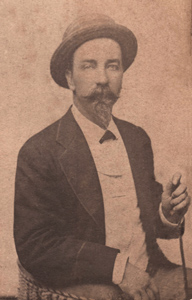 May 19.
Pleasant. Afternoon
Battalion drill by Captain
Palmer.
Dress Parade in the eve. 2 new Sergeants made (Drew
and Cunningham) and 2 Corporals (Putnam & Hebard). [Pictured at right, Charles
N. W. Cunningham, John's messmate, Company A*].
May 19.
Pleasant. Afternoon
Battalion drill by Captain
Palmer.
Dress Parade in the eve. 2 new Sergeants made (Drew
and Cunningham) and 2 Corporals (Putnam & Hebard). [Pictured at right, Charles
N. W. Cunningham, John's messmate, Company A*].
May 20. Pleasant. Company Drill by Lieut Kimball. He was taken sick and I resumed the drilling. At Noon the whole regiment was detailed to clear up a new piece of ground for a camp. Our regt is going in to the first Brigade and is to be under command of Col Leonard. The Division has only 2 Brigades.
May 21. Pleasant. Day was very warm. Fixed up camp in good style. Dress Parade in the eve.
May 22. Warm & Sultry. No drills today, all are busy fixing up camp.
May 23. Warm & Sultry We are busy fixing arches in front of tents &c. Cleaning up for Sundays inspection of arms &c. Battalion Drill in the afternoon. Dress Parade in the eve.
Sunday,
May 24.
Warm & Sultry. Had
Inspection in the Morning. News of Vicksburg being taken.**
Had a dress parade.
May 25. Cool & cloudy. At 9 AM the regt went on picket..
May 26. Cool cloudy. Brigade Guard Mounting in front of Hd Qrs.
*The roster states, Charles N. W. Cunningham; age 18; born, Cleveland, Ohio; druggist, mustered in as priv., Co. A, July 16, 1861; mustered out, October 5, 1863; commissioned in the regular army, and became a captain by promotion; died in Texas, March 9, 1893.
**At this time General Ulysses Grant was trying to take Vicksburg by direct assault. An attack on May 19 failed. An all out bloody assault on May 22 had some breakthroughs but counter-attacks closed the breaches. Strong Rebel fortifications beat back the assault. There were 3,199 Union casualties. (from Civil War Almanac by E.B. Long & Barbara Long, Da Capo Press, 1971).
Diary of Sam Webster, Company D, (drum corps)
Excerpts of this diary (HM 48531) are used with permission from The Huntington Library, San Marino, CA
Thursday, May 21st, 1863
Regiment transferred to 1st
Brigade of 2nd Division instead of 3rd Brigade. Col. Leonard
being Senior Supersides, Col. Root of the 84th N.Y. in command of the
brigade which contains 94th and 104th
N.Y., 16th Maine, 107
Pennsylvania, and 13th Mass. Water fair.
Have moved camp towards White Oak Church - tho' it is still
a
mile or more off - the 6th corps lie nearer to it.
Letters Home; Edwin Field and Charles Adams
Letter of Edwin Field, Company B
Edwin Field of Chelsea, Mass., with a few school friends including Charles Leland, enlisted in the 4th Battalion of Rifles at the outbreak of the war. Edwin was killed at Gettysburg. His parents filed for a pension. To prove their dependence on young Edwin's income from soldiering, the parents presented the government pension agent with 11 or 12 copies of Edwin's war time letters. All the letters were written around pay-day. The letters remain today, in Edwin's Pension File at the National Archives. Noted Gettysburg historian, Timothy Smith shared a copy of the file with me. This is the last of Edwin's pension file letters. Eventually they will all be transcribed and posted on the website.
In
the letter Field makes reference to his comrades who gained commissions
in the 55th Massachusetts Infantry. This was the 2nd
'Colored'
Infantry unit organized by Governor John A. Andrew. When he
put
out the word that Massachusetts was going to organize a 'Colored'
regiment, so many men responded, from Kentucky, Ohio, Pennsylvania and
Virginia, that there were men left over after the ranks of the '54th
Mass.' were full. Governor Andrew decided to organize another
regiment with the men left over, and the 55th Mass.' was born.
To
be an officer in one of these regiments, there were a couple
requirements. The candidate had to ve a veteran with field
experience, and have abolitionist sympathies. Several men of
the
13th became officers in the 55th.
Camp near White Oak Church Va.
May 24th /63
My Dear Sister
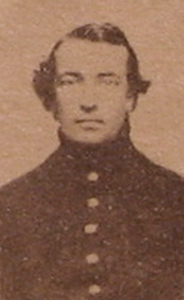
I received your letter of the 12th last week & was very glad to hear that the money I sent arrived home safe I had not heard from you for nearly three weeks & I began to feel a little anxious to hear from home I always feel so when any length of time has elapsed without hearing from you. You have no idea how much good a letter does me from home to hear that Father & Mother are well even if there is not any particular news in it I read it with full as much interest the longer I stay out here the more eager I am to hear from home.
I know how it is with you, you must get very tired with your school duties & of course you do not feel much like writing letters after the duties of the day are over.
We have been encamped in this place nearly ten days & expect to remain some time longer the fact is, we can not make a movement the army has been greatly decreased nearly all the nine months & two years have been mustered out I do not know but we shall have to remain in camp all summer unless they hurry the Conscripts out which I hope will be done & that immediately
We are pleasantly situated here although out in the open field all the troops are out in the open field by order of Hooker they say it is much more healthy we have trimed up our camp very nicely with cedar trees front of every tent arbors are built and the tents are set up from the ground by means of crotches & small poles it gives the camp a very fine appearance nearly all the troops around hear have trimed up the same way We have very good water & plenty of it & we use a great deal of it to I can tell you for we are having extremely hot weather now & have had for the last week we have but little drilling to do our Regt. numbers two hundred & fifty men for duty our Co. numbers twenty six men for duty Col. Leonard is in command of the brigade & Lt. Col. Batchelder commands the regt. our old Capt. Cary was in camp last week he is in the Custom house in Boston I asked him if he knew Unckle Spencer he said he did not he is looking finely & appeared very glad to see the members of his Co.
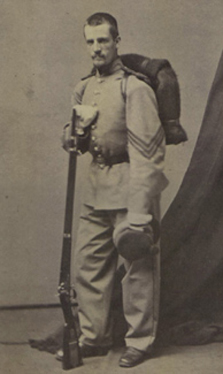 I received a letter from Helen
Kelly last week she said she
had been stopping with you for short time she says she has to study
very hard as her lessons are long and difficult
I received a letter from Helen
Kelly last week she said she
had been stopping with you for short time she says she has to study
very hard as her lessons are long and difficult
I was very glad to hear that Fred Hills arrived home safe I suppose he thinks he has seen some of the hard ships of war but he ought to go through one campaign in Va. if he wants to see hardship I am expecting to receive a letter from him every day
I understand that Gov. Andrew has organized another Colored regt. called the 55th some of the members of this regt. have got commissions in that unit. Lt. Fox has been appointed Major & Sgt Wales [pictured] has been appointed Capt. I would not care if [I] had a commission myself I feel myself fully competent to hold one but it requires a great deal of influence to get one[?] & a great many colors[??] waving [?]
Send my love to Father & Mother remember me to all
inquiring friends
Your affc – Brother
Edwin
Write Soon
Sergeant Wales record in the roster reads as follows: SIGOURNEY WALES; age, 25; born, Boston; clerk; mustered in as sergt., Co. C, July 16, '6l; mustered out as 1st lieut., May 28, '63; was promoted to capt., in the 55th Mass.; residence, 22 Hadley St., N. Cambridge, Mass. -- He is listed as a Major of the 55th Mass., on the notes for this image.
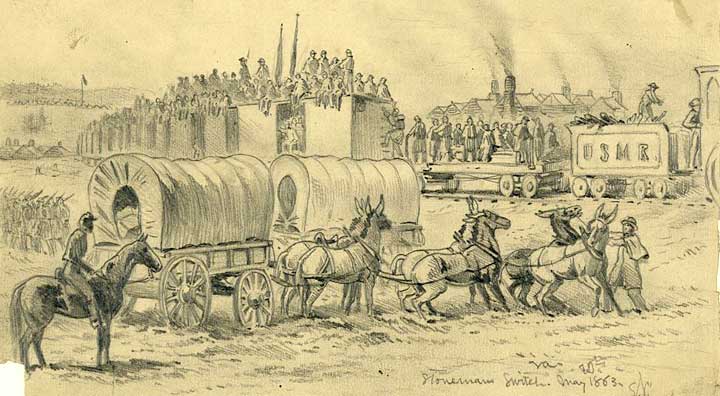
Another great sketch from Edwin Forbes (although tattered around the edges) depicting the departure of troops at Stoneman's Switch, dated May 20th 1863. Hooker had to get his Chancellorsville Campaign underway before enlistment time was up for thousands of "2 years" troops. They are seen here boarding the train to begin their journies home.
Letter of Charles Adams, Company A
Charles Adams to Dear Sister, 26 May, 1863; Charles Adams Papers, Massachusetts Historical Society. Used with permission.
Camp near White Oak Church Va.
May 26th 1863.
Dear Sister
As I have
a few spare moments
this morning, I thought I would answer your letter of the
17th, which I
received a few days ago.
The majority of the regiment went on picket yesterday morning, to be gone for two days, but as I was on camp guard I was not obliged to go, so I am keeping house all alone in my glory. I received Ira’s letter a few days ago after yours & have already answered it.
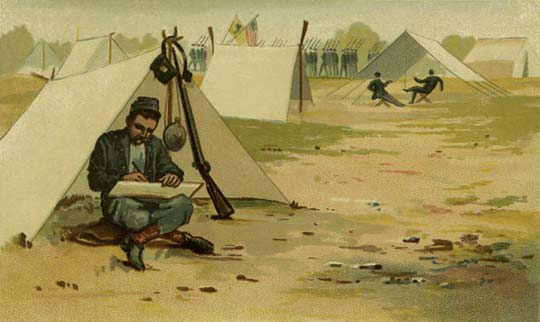
P2
I suppose you all read it at home. He had so much to say about “Heavenly things,” that he did not even mention what he was doing, or anything else. I was sitting in my tent the other day, when I heard somebody inquiring where my tent was, and on going out who should I see but Henry Bird, who used to be in Ebenezer Clapp’s Store.
We had quite a long talk about old times &c. He is in the 62 N. York Reg.mt & is now a corporal in Co D. His Regmt is in Sedgewicks Corps (6th) which stormed the Heights of Fredericksburg in the last battle, & is encamped about two or three miles from us. He had a list of Dorchester boys who had enlisted, their Regmt & companys which Clifton Phipps had sent him, so he had hunted me up without trouble. He says he enjoys excellent health, &c and is coming over to see me again. Hon Henry Wilson was here a few days ago.
P3
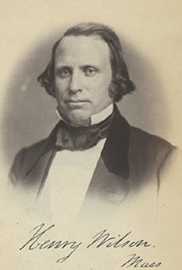 There
is a company in this regiment from
his native town (Natick, Mass.)* I suppose John told you
about
Abijah Jenkins who is in this regiment. He said he was
acquainted
with you & John. He is one of the color Corporals (or
guard). He wished to be remembered to you
both.
There is a
Stoneham Company in this regiment & I think likely that you
know more
of them.** There has been considerable excitement
here, the
last
few days, occasioned by the success of Grants Army in the
West. It was read on dress parade and as it has not
been
contradicted, I suppose it is true. By the way,
have you
learnt
any new songs lately ? I have if you have not, and I may
call
round some night & serenade you.
There
is a company in this regiment from
his native town (Natick, Mass.)* I suppose John told you
about
Abijah Jenkins who is in this regiment. He said he was
acquainted
with you & John. He is one of the color Corporals (or
guard). He wished to be remembered to you
both.
There is a
Stoneham Company in this regiment & I think likely that you
know more
of them.** There has been considerable excitement
here, the
last
few days, occasioned by the success of Grants Army in the
West. It was read on dress parade and as it has not
been
contradicted, I suppose it is true. By the way,
have you
learnt
any new songs lately ? I have if you have not, and I may
call
round some night & serenade you.
I have not heard from Mary Ann for a long time, but as I wrote last I shall expect an answer before I write again. Tell George to inclose $1.00 of stamps when he writes again
P4
as I have only six left of those he sent last. I would like 10, one cent stamps & the rest three’s. I hear occasionally from W. Clapp & Johnny Robinson, also from Clifton Phipps, Wallace & some others so I have my hands full to answer them all. As my stock of writing matter is about played out & I am ditto, I think I had better close & get dinner. I shall expect a good long letter from you very soon, so you know what to expect. Love to all the folks, and inquirers,
From Your
Brother
Chas. F. Adams
I
have just rec’d a letter from Johnny
Robinson. His vessel is
to
convoy a ship from N. York bound to California.
They are to
accompany her till she strikes the S East trade winds 5 or 6 degrees
south of the equator & then will return & be discharged.
He
sends
his respects to all the Dorchester folks.
C.F.A.
NOTES
*Senator Henry Wilson of Natick, Mass, a
tireless supporter of the cause of the Union and abolition of
slavery, frequently visited
Massachusetts troops to look after their needs. Company H was
organized in Natick.
** Company G was organized in Stoneham.
Illustration by Louis K. Harlow
Major Gould's Speech & General Reynold's Review
Diary of Sergeant John Boudwin
From the collection of the Pearce Museum, Navarro College, Texas.
May 27 Cool & Cloudy. Brigade Guard Mounting at 10 AM The Regiment came in from picket. Received orders at noon to hold ourselves in readyness to march at a moments notice. At 1PM the order was countermanded. Had a dress parade in the eve. Major Gould made a speech and declined the present the boys were going to make him and said the money would be put to as good use by sending it to some Bank in Boston for the Benefit of Disabled Men of the regt. And he made an addition of $50 to it.
Roxbury City Gazette, June 13, 1863
The speech of Major Gould made its way into one of the Hometown Newspapers in June. Here is a full account from the Roxbury City Gazette. The following was downloaded from the currently dormant website "Letters of the Civil War" by Tom Haynes.
THIRTEENTH MASSACHUSETTS.
JUNE 13, 1863.
A Self-Denying Soldier.
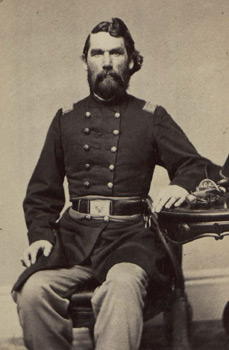
Our old friend Major J. Parker Gould, of Stoneham, of the 13th Mass. Regiment, who has gallantly led his command in several hard fought battles and is deservedly popular with his men, has declined to accept the horse and equipments which they intended to present to him and for which they raised by subscription the sum of $500.00 on their last pay day. In his letter declining the handsome testimonial, the Major uses the following noble language:-
“But circumstances make this inopportune for the reception of the presents. A more favorable time will occur for the interchange of testimonials. We have been several times engaged in battle with the enemy. These engagements have much reduced our rank and file. Many a noble comrade in arms has found a grave on the field of battle, while many others, as noble, have returned home disabled for the remainder of their life. Their friends are thereby deprived of the support and the many enjoyments they would otherwise have received from the manly hands of those who left homes two years ago on their patriotic mission. We are still in the field. We have yet one third of our time to serve. Your valor may again and again be tested in battle. We must learn the future from the past, and be admonished by it. I could hope that every member of the regiment, Providence so ordaining it, should return to his home. But I fear a more honorable mission awaits some whom I now address, on some memorable battlefield, whose loss, their friend will have to mourn when they proudly reflect upon your fearless heroism; while the only joy of others in their life-long maimed condition, may be their consciousness of faithful duty performed in the field. Those who may be permitted to return home will receive the gratitude of a loyal people and enjoy the admiration of their friends. Those who should reap a soldier’s honors here, will leave to their heirs a rich legacy of patriotism and honor.
With these considerations, gentlemen, I most respectfully decline the testimonial designed me. I have, however, this proposition to submit to you, that the sum now raised be placed on deposit in some institution in Boston, subject to supervisors of our own selection, under whose direction it will be expended for the benefit of such members of the Thirteenth Regiment as become disabled in the service, or for the benefit for the families of such as have been or may be killed in battle, or die in the service. Should this proposition meet your approbation, I will add fifty dollars to that amount, to be expended in the same manner. And, gentlemen, though I decline the testimonial, let us trust that the same sentiments of mutual regard will continue to be enjoyed to the close of the service. With the highest respects for you as soldiers and men, accept my sincere thanks for the compliment tendered to me.
I
remain most
respectfully
and
truly, your friend,
J. P.
GOULD,
Major 13th
Regt.
Mass.
Vols.
(Roxbury City Gazette; June 11, 1863; pg. 2, col. 3.)
Major Gould was detailed for detached duty, July 1st, and departed sometime around then for Boston, where he was initially sent to supervise the conscripts drafted for the regiment. He did Provost Marshal duty on Long Island in Boston.
Diary of John Boudwin, continued.
From the collection of the Pearce Museum, Navarro College, Texas.
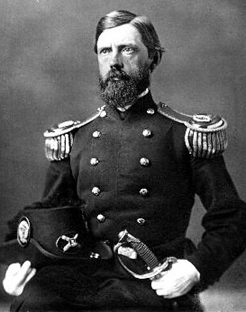 May
28.
Pleasant.
Brigade
Guard Mounting. No drills to day.
Dress Parade. One of Co. K court-martialled
& fined $3 for Improper Conduct.
May
28.
Pleasant.
Brigade
Guard Mounting. No drills to day.
Dress Parade. One of Co. K court-martialled
& fined $3 for Improper Conduct.
May 29. Pleasant. Morning Drill in skirmishing. Afternoon Battalion Drill. Eve. Dress Parade.
May 30. Pleasant. At 5 AM marched 1 mile towards White Oak Church to be reviewed by Gen Reynolds and staff. We appeared in white gloves and looked well. Dress Parade
Sunday,
May 31.
Pleasant. At 6 Am Regimental
Inspection by Lt. Col. Batchelder. Afternoon paymaster
arrived and received my pay up to May 1st.
Diary of Sam Webster
Excerpts of this diary (HM 48531) are used with permission from The Huntington Library, San Marino, CA
Saturday,
May 30th, 1863
Corps
review by Gen. Reynolds at 7 in the morning. Very fine.
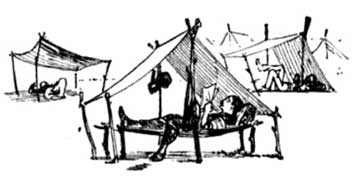 Have fixed
up a tent with canvas sides, double
length beds
at one side, feet together, heads toward ends. Sawyer and I
at
one end. Ike and Libby at the other. Have our beds
raised on pole slats and pine tree "feathers." Weather
exceedingly warm. Tents screened as well as ornamented by
pine and cedar trees. The camps of the 3rd Division are very
nicely fixed in the same manner. 3rd Divison are
mostly new Regiments who relieved the Pennsylvania Reserves.
They are all Pennsylvania troops. The Brigades,
Divison and Corps are all desingated by badges, flags and colors, by
which they are very easily distinguished.
Have fixed
up a tent with canvas sides, double
length beds
at one side, feet together, heads toward ends. Sawyer and I
at
one end. Ike and Libby at the other. Have our beds
raised on pole slats and pine tree "feathers." Weather
exceedingly warm. Tents screened as well as ornamented by
pine and cedar trees. The camps of the 3rd Division are very
nicely fixed in the same manner. 3rd Divison are
mostly new Regiments who relieved the Pennsylvania Reserves.
They are all Pennsylvania troops. The Brigades,
Divison and Corps are all desingated by badges, flags and colors, by
which they are very easily distinguished.
JUNE,
1863
Philadelphia Inquirer, June 8, 1863
PHILADELPHIA INQUIRER
June 8, 1863
General
Robinson’s Division.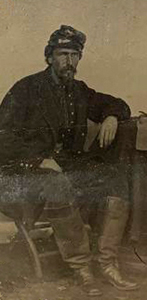
Among the regiments composing this truly splendid division are several from Pennsylvania. Although not in numbers as strong as some others are, nevertheless this division is not excelled in point of discipline and efficiency by any in the service. Their commander, General Robinson, is ever modest, quiet and unobtrusive in demeanor, a true soldier, knows well his duty and does not in any manner shrink from performing it; brave and gallant upon the field and possessed of administrative abilities not excelled by any.
The spot selected as the encampment of this division is among the shadiest and coolest in our whole encampment. Several springs of cool and delicious water are within its boundaries, while so well and faithfully are its police duties performed, that the grounds and its surroundings are kept neat and tasty.
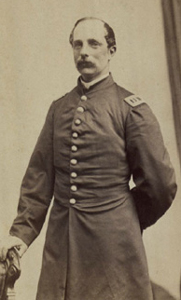 One of the
peculiar
as well
as admirable traits of the
troops comprising this division consists in the fact that the houses
and
property of the residents near where it is located, whether Union or
“Secesh,”
are never in any way disturbed or molested, everything remaining in the
same
order as left by their decamping owners.
One of the
peculiar
as well
as admirable traits of the
troops comprising this division consists in the fact that the houses
and
property of the residents near where it is located, whether Union or
“Secesh,”
are never in any way disturbed or molested, everything remaining in the
same
order as left by their decamping owners.
The following named gentlemen are members of the gallant General’s staff: –– Lieut. Morgan, of Eighty-sixth New York, Assistant Adjutant-General; Lieut. Bralton, of One-hundred-and-fourteenth Pennsylvania Volunteers, Aid; Capt. [Charles] Hovey, of Thirteenth Massachusetts, Inspector-General; Capt. Mason, Assistant Quartermaster; Capt. Fred Gerker, of your city, Commissary; Lieut. [Melvin H.] Smith, Thirteenth Massachusetts, Ordnance Officer; Assistant Surgeon Nordquist; while the amiable and skilled Dr. Whitney, of the Thirteenth Massachusetts, is the Medical Director.
NOTE: That's Ordnance Officer Melvin H. Smith, top, and Inspector General Hovey, bottom, both of the 13th Mass. Also - I believe the newspaper is wrong, Lt. Morgan was in 88th NY & Lt. Bralton in the 104th PA.
From the collection of the Pearce Museum, Navarro College, Texas.
June 1. Pleasant. Company Drill. Batallion drill by Lt Col Batchelder. The day was very warm and dusty. Dress parade in the evening by Col Batchelder.
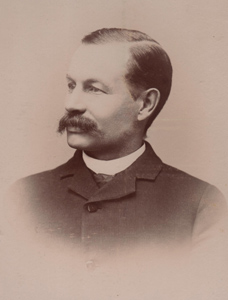 June
2
Pleasant & warm. The regiment was on picket.
Sergt
C from
our company Grand Guard Mounting of picket and Camp Guard.
Went down to
brook and had a good bath my self and Charley Drew [pictured at right, Sgt. Charles
A. Drew*].
June
2
Pleasant & warm. The regiment was on picket.
Sergt
C from
our company Grand Guard Mounting of picket and Camp Guard.
Went down to
brook and had a good bath my self and Charley Drew [pictured at right, Sgt. Charles
A. Drew*].
June 3. Pleasant. Orders to March and countermanded again. The regiment came in from Picket. No drills. Battallion drill in the afternoon, dress parade in the Evening.
June 4. Pleasant Morning. Company drill, afternoon Brigade drill by Col Leonard. Evening dress parade. Orders read to hold ourselves ready to march at Short notice. Evening at 9 PM orders to March at daylight.
June 6 Pleasant. At 2 a.m. the long roll was beat and we got up and cooked Breakfast. At day break struck tents and formed in line and stacked arms and laid-around camp all day. No orders came for us to start. At sunset pitched tents on our old ground. report that our forces 6th Corps across the river. Not many rebels over on the other side of the river as all firing was done by our side. At last a shower of rain and it was very much needed.
Sunday,
June 7.
Pleasant.
Inspection by Major Gould.
Nothing ocurred during the day. Evening dress
parade
*The roster states, Charles A. Drew, age 21; born, Boston; clerk; mustered in as priv., Co A, July 20, 1861; mustered out as sergt., August 1, 1864; residence, Northfield, Minn.
Letter of Warren Freeman, Company A.
Near White Oak Church, Va., June 7, 1863.
Dear Father, - There is no particular news in camp to-day. Part of the Sixth Corps crossed the river day before yesterday. On Thursday morning last, at daylight, we were routed out and ordered to pack up our duds and strike tents; soon after fell into line and stacked arms, then in the middle of the forenoon were told to pitch our tents and make ourselves comfortable. We had a brigade drill in the afternoon at four o'clock, and had the pleasure of turning out and packing up and striking tents again. Towards night it looked like rain, so we pitched our tents; shortly after we had quite a thunder-shower, the first rain we have had in sufficient quantity to lay the dust for three weeks. The dust is very annoying; it sifts into our tents and keeps us constantly dirty.
We have just finished our Sunday Inspection. We do not have religious services now, Chaplain Gaylord having left us.*
Our company has had in all about 130 men since we have been in the service; we now report twenty-six men for duty. Some of our absent comrades have been killed in battle, many more were wounded and carried to hospitals to die or be sent home; some have been promoted, several are on detached service, and a few have deserted. We number in the regiment 280 men for duty.
Warren.
*Chaplain Gaylord left the regiment March 12th, 1863, to accept a position of post-chaplain at Campbell Hospital, Washington, D.C.
Diary of John Boudwin, Continued.
From the collection of the Pearce Museum, Navarro College, Texas.
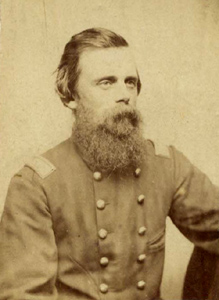
June 8. Pleasant. Morining drill. Everything quiet in camp. Afternoon Brigade drill by Col Leonard down to the river. Evening dress parade.
June 9. Pleasant. Morning drill. Took Company out and went through Company movements &c. Afternoon Batallion drill by Major Gould and Col Leonard. Evening Dress Parade.
[Colonel Leonard, pictured, right].
Diary of Sam Webster, Continued.
Excerpts of this diary (HM 48531) are used with permission from The Huntington Library, San Marino, CA
Monday, June 8th, 1863
Had a picture taken, and send it, with
one of Ike, [Sam's
Brother] to Uncle
George, today. The 6th Corps has been moved near
Fredericksburg. A lot of books arrived the other morning, as
we were packed up to march, and they got pretty well scattered.
I got hold of, and had nearly finished "Dred"
by Mrs. Stowe,
when I found there were two volumes, and I hadn't the second.
I found it, however, no one thinking a 2nd volume worth
carrying off. Yesterday while the Brigade drilled on a field
about a mile from and sloping toward the river, I mounted with a spy
glass into a tall pine. Found it very cool and nice swaying
in a comfortable seat to and fro in the breeze, but saw only a few
cavalry piquets, and deserted winter camps and a small earthwork on the
bank of the river. Guard-mounting with packed knapsacks is
the order of the day. Anything for work on a hot day -
officer's rule. Have also been over to the 12th Corps to see
Captain Tourison. His Co. is now the 147th Pa.
Both
he and his son (his Lieutenant) were wounded at Antietam, the Capt. in
the same place where he was hit while in Mexico. They lay
near Brooks
station. Our present method of messing proves very
agreeable. Sawyer is Brigade Drum Major; though some of the
other regiments - or their drummers - objected at first.
General Orders
No. 50
Headquarters
Second Division
First Army Corps,
June 10, 1863
1. Existing orders require a critical inspection of companies half an hour before dress parade, the object of which is to see that men are in a proper condition to go on parade, that the clothing and accoutrements are clean and in good order. At dress parde of ceremony, officers and men will be required to appear in uniform. Regimental commanders are reminded that white hats and butternut colored sacks form no part of the prescribed dress of a soldier, and must not be worn on parade. Soldiers will be allowed to wear them on fatigue. The practice of wearing boots or stockings outside of pantaloons must be suppressed on parade.
By command
of
GENERAL ROBINSON.
Diary of John Boudwin, Continued.
From the collection of the Pearce Museum, Navarro College, Texas.
June 10. Pleasant. Sergeant of Camp Guard to day. Regt. on picket at 12 noon. Orders came from picket to send out Camp Guard. I went out with the Men and acted as reserve. Up all night. Everything quiet along the line.
June 11. Pleasant, slight shower in the morning, sent out relief. News of the fall of Vicksburg from Corps Headquarters. Order to March in the morning of the 12th. At 12 midnight orders to march back to camp without delay.
The next day June 12, began the long, hard, hot & dusty march north in pursuit of General Lee's Confederate army.
"Libby Prison" by John S. Fay
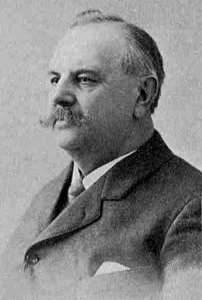 Sergeant1John
S. Fay's wound
gave him the distinction of being the most severely
maimed
survivor of his regiment, and also the same of the
831 men
that served in the military from his hometown of
Marlboro,
Mass.
Sergeant1John
S. Fay's wound
gave him the distinction of being the most severely
maimed
survivor of his regiment, and also the same of the
831 men
that served in the military from his hometown of
Marlboro,
Mass.
A few versions of John Fay's story exist. The earliest is a hand-written account of his war time experiences created as part of his re-habilitation therapy - learning to write left handed. That document was donated to the Fredericksburg National Battlefield Park in 1996 by Mr. Peter Bolan, one of Fay's many descendants. Park Historian John Hennessy sent me a digitial copy of this. Also included were two typescript reminiscences; one of the Maryland Campaign and a later version of his Libby Prison experiences. The second reminiscence titled, 'Libby Prison,' appeared in the 13th Regiment Association Circular #23 in December, 1910. The two versions differ in detail. The following narrative is a combination of the un-edited 'earlier' version with occasional 'inserts' from the later version.
The date of his parole varies between July 14th & 16th, 1863. I believe it was the 14th. Fay was 23 years old when wounded. I've made a few spelling changes, but kept much of his idiosyncrasy in tact. Biographical information was compiled by Mr. Peter Bolan.
The captivity of Allston Waldo Whitney, Surgeon of the 13th Mass who operated on Fay, is recorded in the Official Records of the War of the Rebellion; SERIES II - VOLUME VI [S# 119]. He writes from Washington, November 27, 1863, "I arrived in this city yesterday after imprisonment of nearly five months as a prisoner of war in Libby Prison, Richmond, Va." - Brad Forbush, May 18, 2013.
Sam Webster, 13th Mass. Co. D, wrote the following in his diary the day after John Fay was wounded:
Friday, May 1st,
1863
Reported at Fitzhugh House, now used as First
Corps Hospital. Went out to the barn and
husked corn to get
filling for ticks. The boys have contributed about $250.00 to
Fay.
Memoirs of John S. Fay
On the 28th of April we was ordered to pack up and march. We left our camp about noon and marched seven miles and bivouacked for the night.
The next day we marched down to the Rappahannock river, near to the place where we crossed in December. The first division of our Corps [Wadsworth's Division] had laid a Pontoon Bridge, and crossed over and was in Line-of-Battle on the south side.
We was formed in line on the north side, in such a position that we could readily cross to the support of the first Division if necessary.
The Rebels had artillery in position on the hill about a mile and a quarter back from the river, from which they was trying to shell us, but they did not succeed in getting range of us.
It commenced
to rain in the
afternoon and continued to rain at intervals during the
night.
We lay in the same
position all night and
most of the next day. The
Rebels would
try to shell us every hour or two, but without effect, until about
three o’clock
in the afternoon when they succeeded in getting range upon us with a
battery of
twenty pound guns. 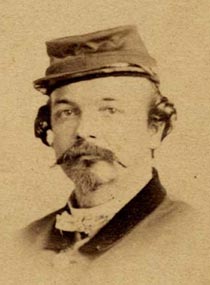 About
two o’clock a
dispatch was read to us from Gen Hooker stating that he had succeeded
in
crossing the river at United States Ford fourteen miles above
us with
the rest
of the army. We
now
knew that our
movement was only a feign to draw the rebels down the river from the
fords
above us. Gen
Hooker’s dispatch was
received with great cheering which so provoked the rebels that they
opened a
vigorous artillery fire upon us, and advanced their infantry and
commenced to
skirmish with the first division.
Our
division was in mass so if a shell fell among us it must hit somebody,
About
two o’clock a
dispatch was read to us from Gen Hooker stating that he had succeeded
in
crossing the river at United States Ford fourteen miles above
us with
the rest
of the army. We
now
knew that our
movement was only a feign to draw the rebels down the river from the
fords
above us. Gen
Hooker’s dispatch was
received with great cheering which so provoked the rebels that they
opened a
vigorous artillery fire upon us, and advanced their infantry and
commenced to
skirmish with the first division.
Our
division was in mass so if a shell fell among us it must hit somebody,
Several shells fell in other Regiments killing and wounding several men, when about fifteen minutes past five o’clock a shell fell among my Company, killing my Capt. George N. Bush and Second Lieut. Wm. Cordwell, and wounded myself, a piece of shell hit my right hand and right knee. At the time I was hit, I was lying on the ground resting upon my left elbow, my right leg bent, the foot resting on the ground my right hand resting [on my] right knee. A piece of shell passed through both hand and knee tearing my hand all to pieces and nearly severing my leg at the knee.
Soon after I
was wounded I was
packed up by Andrew J. Mann, and by him with the assistance of another
man, [Enoch C. Pierce,
pictured, above, right]2
was
carried to a house
about a mile in the rear that had been taken for a hospital.3
When they
was
carrying me to the hospital I was satisfied that my leg and arm would
have to
be amputated, after they got me there,
and the Doctors told me so I
requested
that Dr. A. W. Whitney of my Regiment should perform the
operation.
After waiting a
few minutes for him to get through with another patient that he was at
work
upon when they carried me in they
gave
me chloroform and that was the last that I knew until about half past
eight
when I came out of the effects of it and found my right hand and right
leg
amputated.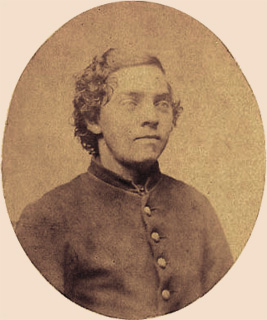
Acting hospital Steward S. E. Fuller [pictured, left] of my Co took care of me that night. in the night Col. Leonard came in to see me. The next day our Regt lay in line – of – battle in front of the hospital, and through the day nearly all the officers and men came in to see me. That night the Regt was ordered up the river with the rest of the Corps and crossed the river and marched to Chancellorsville and ... [there is a tear on the page here] ... battle was fought at that place in a ... [page is torn] ... afterwards. When our corps wer ordered off, the hospital, with about one hundred and fifty of us patients was left in charge of Dr. A. W. Whitney. This was a fortunate [thing] for me, for he was very interested in my case and he had the best of care taken of me. I am also greatly indebted to Acting hospital steward S. E. Fuller of my Co. and Chandler Robins of Co K of my Regt from Westboro, for the care they took of me. After the battle of Chancellorsville, and our army recrossed the river our Regt was encamped about a mile from the hospital and some of the officers or men came in to see me every day. I improved very fast and was considered
Out
of danger at the end of
four weeks. As
fast
as any of the patient[s] got well
enough so they could be move[d] without danger they was sent to
Washington. [Attentive
Hospital Steward Chandler Robbins of Westboro, Mass. pictured
at right.]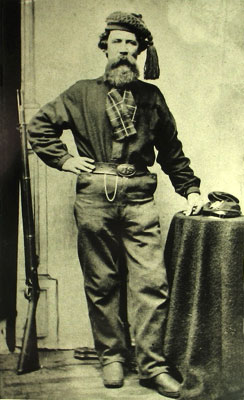
*******
Later version:
After my limbs were amputated by Dr. Whitney I was put into a front room on the lower floor of the house. The Pennsylvania boy was put into the same room.4 My intention was called to him by his movements, which indicated he was suffering intensely. The doctors first thought they could save his leg, but in the afternoon of the next day after we were wounded they told him they would have to amputate it.
It appeared that as soon as possible after he was wounded his captain sent word to the boy's mother, whose home was near Philadelphia, and she had telegraphed her son that she would be with him as soon as possible. In the evening of May 1, when the surgeon told him they would have to amputate his leg, he begged of them not to or at least to wait until his mother arrived.
The surgeon told him his mother could not come to him, for the War Department had issued strict orders to allow no one not connected with the army to go south of Washington. The boy replied, "Doctor, you don't know my mother. She has telegraphed me that she was coming, and she will come."
The surgeons decided to wait until morning before operating on him. They gave him opiates, so he was quiet nearly all night. I could not sleep. My bed was placed near one of the front windows, so I could look out on to the road that led up to the house. I spent the weary hours of the night watching that road, over which was much passing during the night.
In the morning soon after daylight I noticed an ambulance coming up the road. It drove up to the house and stopped, and to my surprise a woman alighted from it. She was met at the door by the assistant surgeon, who was on duty at that hour.
Soon he went over to Dr. Whitney's tent, which was pitched in front of the house. Dr. Whitney soon appeared. After a little delay he came with the woman into our room. I recalled the conversation I overheard early in the evening between the surgeon and the boy about the boy's mother. I knew she had arrived.
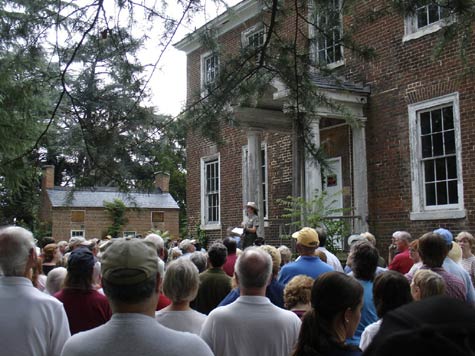 The surgeon went over to the
boy's bed to wake him. The
opiates had nearly spent their force. He soon rallied.
The doctor
motioned for the woman to come over to the bed and the poor
fellow caught sight of his mother. After a hurried kiss the mother
told the boy his leg would have to be amputated to save his
life.
The boy replied, "All right mother, if you say so."
The surgeon went over to the
boy's bed to wake him. The
opiates had nearly spent their force. He soon rallied.
The doctor
motioned for the woman to come over to the bed and the poor
fellow caught sight of his mother. After a hurried kiss the mother
told the boy his leg would have to be amputated to save his
life.
The boy replied, "All right mother, if you say so."
He was soon taken out of the room, the operation performed, and within an hour was brought back in an unconscious state. I learned afterwards that the surgeon did not expect he would ever come out from the influence of the ether. The doctor and the mother worked over him for a long time; finally they were rewarded by his coming to, but he was very weak; he had suffered so much from the wound before the amputation he was in a high fever and for more than a week his life was despaired of. It seemed as though that devoted mother never left his bedside; finally after seven or eight days he began to improve. Then the doctor commanded his mother to take some rest.
(Photo: A park historian from Fredericksburg & Spotsylvania National Park gives a rare presentation at the Henry Fitzhugh House near Fredericksburg circa 2011. The house is not on park land and is danger of being razed. It is currently owned by a developer. The picture was taken by Clint Schemmer of the Fredericksburg Star.)
As the boy improved, the mother began to take an interest in the three other badly wounded men that were in the room with him, of which I was one, so I had an opportunity to converse with her. I learned she was a widow; her wounded boy was her oldest child. He was but eighteen years old. She had three other children. She was a slender, frail appearing woman of medium height, very energetic, a skilful nurse, and she proved to be very brave.
I heard Dr. Whitney tell her that it was her skilful nursing that saved the boy. She told me her parents and her husband were Germans. Her name as she pronounced it sounded as though it was spelled "Large." I was in no condition to write. I have always regretted that I did not learn where her home was. She showed me many kindnesses for which I was very grateful.
When my folks at home heard I was wounded my brother-in-law started for Washington to find me. He had a brother who was pay-master in the army, with the rank of major, who happened to be in Washington at the time.
My brother-in-law with the major visited many of the hospitals in and around Washington trying to find me, but without success. Finally the major learned where I was. As there were strict orders at that time to allow no citizen to visit the army at the front, it appeared as though my brother could not get to me, but the major fitted him with a uniform, gave him papers showing he was the major's clerk, which passed him on to the boat that carried him down the Potomac river to Acquia Creek landing, which, was about ten miles from the hospital where I was.
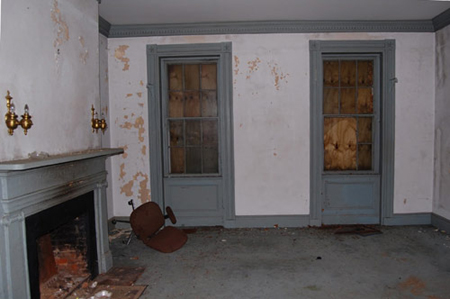 He arrived on May 15th and
stopped with me about one week. When he left
for home he was assured I should be carried to Washington as soon as I
could be safely moved.
He arrived on May 15th and
stopped with me about one week. When he left
for home he was assured I should be carried to Washington as soon as I
could be safely moved.
Photograph of one of the lower front interior rooms of the house taken by John Cummings in 2008. [spotsylvaniacw.blogspot.com] The windows face southwest, or to the front entrance. This may be the room where John Fay was placed.
When the hospital was opened there were about two hundred sick and wounded put into it. Tents were pitched near the house to accommodate most of them. The location was healthy and apparently secure. When men had recovered so they could be safely moved they were carried to Washington, so that by the middle of June there were only about thirty-five remaining in the hospital; about one-third were sick with fever and the remainder were wounded; they, with the nurses, surgeons, and guard, making about eighty men and one woman remaining on duty June 15th. On the night of June 14th the army of the Potomac started on a march northward in the movement which culminated in the battle of Gettysburg.
When the first corps left their camp near our hospital an officer with an ambulance train was sent down to remove us. There was a heavy thunder-storm that night. In the darkness and rain he got lost. When daylight appeared he could see, from the bluffs where he was, the rebel army crossing the river down in front of our hospital about a mile distant.
The officer became frightened. He turned his train of empty ambulances northward and started to catch up with the Union army, leaving us to be captured without making any attempt to remove us. I have never been able to learn who that coward with shoulder-straps was.
When Dr. Whitney learned we had been abandoned he ordered his hostler to mount his best horse (the doctor had two horses) and ride to Washington. The assistant surgeon, a New Jersey man, asked permission to go. Dr. Whitney gave it. He might have escaped himself, but like the brave man he was he stood by us.
*******
Original Narrative, cont'd.
On the night of the 13th of June the army started northward and left thirty four of us patients and the nurses cooks and the Dr in the hospital to be taken prisoners. This we did not like very well but we could not help ourselves. On the 15th the fourteenth SC rebel Regt crossed the river and came up and took us prisoners. They paroled us and went off and we saw no more of them. The next day the 16 th Va. rebel cavalry came over and picketed in vicinity of the hospital, and they had charge of us until we was moved to Richmond. Our army left us ten days rations when they was going. The rebels gave us some flour and bacon. On the 1st[?] of July the rebel docter came over and started us to Richmond it was raining very hard at the time. They took us out of the house that we had used for a hospital, and put us into ox carts and carted us about a mile to the river.
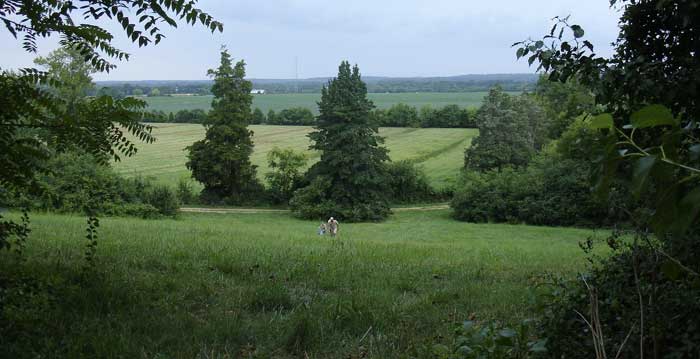
View from treeline on the hill in front of house facing south toward the Rappahannock River in the distance. Photo by Clint Schemmer.
They then put us in an old [flat] boat and ferried us across the river then put into wagons and carried us about four miles, over a very rough road to the rail road. After laying about three hours in the rain at the railroad, they put us into baggage cars that had previously been used to carry cattle in, and started us for Richmond. It was about two o’clock when we started, and we arrived in Richmond a distance of sixty miles at one the next day. The cars was very poor and the road was worse and the cars did not go faster than a man could walk. After we arrived in Richmond we lay in the cars about two hours, much to the delight of about a thousand women and children who came to take a look at a live yankee.
*******
Later version:
The car was very dirty. We were laid on the floor of the car so close together we hardly had room to turn over. The weather was intensely hot. The only opening in the car for light and air was a slide door on each side in the middle of the car. They would not even let us have straw to lie on. Several of our patients were typhoid fever cases and most of them were delirious. Fortunately I was placed near the open door, as was Mrs. Large and her boy. She sat on the floor of that filthy car with her son's head resting on her lap most of the time. About dark the train to which our car was attached started for Richmond. After running a few miles we were side-tracked for several hours. It was a terrible hot night. We were suffering intensely from thirst. The guard would not give us water or let any of the well men of our party who were riding on top of our car get water for us. Once in the night the devoted mother begged so hard of the officer in command of the guard he sent a man to get her some water. She gave me two or three swallows. Oh, how precious it was ! Men in that car were struggling in death agony. One died before we reached Richmond.
We arrived in the suburbs of Richmond early in the morning. About 9 A.M. our car was detached from the train and drawn into the city by horses. We were soon surrounded by a crowd of half grown boys who amused themselves by throwing missiles at us.
Soon a rebel guard was placed around the car and stopped the boys' fun.
I remember the guard was commanded by a lieutenant who was lame from a wound he had previously received in battle. He treated us as kindly as he could. He was the first rebel to show us any kindness since we were captured. He let Dr. Whitney come into our car to help us. He ordered the body of our dead comrade taken out, but it was several hours before we were removed.
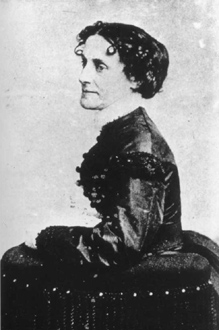 It was very hot and we were
suffering intensely. Dr. Whitney
was
standing beside the car in front of the open door when a lady, whose
hair was gray, dressed in a black silk, came down and asked for
permission to speak with the Yankee doctor, which was granted.
It was very hot and we were
suffering intensely. Dr. Whitney
was
standing beside the car in front of the open door when a lady, whose
hair was gray, dressed in a black silk, came down and asked for
permission to speak with the Yankee doctor, which was granted.
Soon the officer in command of the guard was called. Dr. Whitney and the lady made a request which I could not hear. The officer replied, "Yes." The lady hurried away and soon returned followed by a negro with two pails of ice water. The guard allowed the negro to come into our car and give each one of us a drink of ice water. I cannot describe how refreshing it was. I heard one of the guard remark, "That woman was a damn Yankee and she ought to be locked up." I never learned who she was.5
[Note: It was probably Elizabeth Van Lew, pictured, a wealthy Richmond Unionist, & spy for the Union cause, who made constant efforts to aid Northern Prisoners at Libby.]
*******
Original Narrative:
They then put us into coal wagons and carried us about three miles through the city over rough pavements, to Libby Prison. It was about four o’clock when we arrived there.
We had nothing to eat since the morning before and our wounds was very painful for they had not been dressed since then. We was put into the part of the prison called the prisioners hospital, into a room with about one hundred others many of them but slightly wounded. Some of them (our slightly) immediately dress our wounds for us, and we ??? had something to eat. Dr Whitney was confined in another part of the prison and not allowed to have any thing to do with us after we arrived there. We remained there until the 15th day of July. Twice in that time we was paroled and told that we was to be sent off next morning into our lines the next day, but when the time came they would have some excuse for not sending us. There was about one hundred of us wounded and sick in a room together, many of them sick with contagious diseases, the weather was very hot and our room was very poorly ventilated, all of our water we got come from the James river And was very warm and muddy.
Pictured is Libby Prison, attributed to the date August 23, 1863. The image was accessed from Mike Gorman's site, "Civil War Richmond." His caption reads: "A post-war stereoview of this image declares on it's backmark that it was taken August 23, 1863. Sandra V. Parker, in her book, "Richmond's Civil War Prisons," declares that the four figures in the right foreground are: William D. Turner, (son of Richard Turner), Erasmus Ross (prison clerk), Richard Turner (jailer), and Thomas P. Turner (commandant)."
The lower left corner bears the photographers stamp, 'Rees, Richmond.' This picture would have been taken about 5 weeks after John Fay's parole. Richard Ross, the prison clerk was part of Elizabeth Van Lew's spy network.
*******
Later version:
We were put into a room on a level with the sidewalk on the street front, but on the rear side of the building. There was a basement, so from that side our room was on a second story.
The room was called the hospital of the prison. It was about seventy-five feet long and thirty feet wide with a door and one window in front protected by iron bars and two small windows in the rear. Only on sunny days was the center of the room light enough for a person to see to read. The floor was covered with cotton ticks filled with straw. Each tick was about three feet wide and six feet long. Two spaces about two feet wide were reserved for a passage the length of the room. There were a few cot bedsteads in the room. I was placed on a tick on the floor in the rear of the room with three bunks between mine and one of the rear windows.
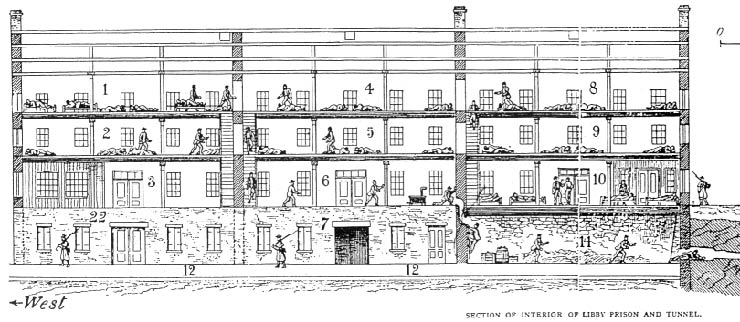
DIAGRAM OF LIBBY PRISON [Cropped].
Rooms # 1 & # 2 held important prisoners;
# 3 is the Commandant's Office; # 4 & # 5 are the
upper
& lower Chicamauga rooms; # 6 is the dining room;
# 7 is the carpenter's shop, (middle cellar); # 8 & #
9
are the upper & lower Gettysburg rooms; # 10 is the
hospital room where John S. Fay was confined; # 11 is the east
cellar or 'Rat Hell.' The diagram was drawn to show
the tunnel through which 109 Union inmates escaped Libby
Prison in
February, 1864.
About half of the occupants in the room were commissioned officers, mostly from Grant's army, having been wounded and captured, in the battles around Vicksburg, Miss. After resting a little I began to look around to see where the rest of our party were. I saw the Pennsylvania boy on a bunk not far from me. I was strong enough to crawl on the floor, so I made my way over to him and inquired where his mother was.
He did not know. He said they would not let her ride in the wagon with him. The last he saw of her she and Dr. Whitney were being escorted down the street by the lieutenant of the guard.
They told him his mother would be confined in Castle Thunder, a building where they imprisoned citizens who were not soldiers. He was much discouraged; never expected to see his mother again.
The exchange of commissioned
officers was stopped, so some of the Union soldiers had been confined
in that room many weeks and had nearly recovered from their wounds.
They were all very kind to us. One young officer
about my age, who was
a lieutenant in an Iowa regiment, had lost one eye from a wound
received in the battle of Jackson, Miss., helped me much.
He said his father and mother were from
Massachusetts but he had never seen the old Bay State. I told
this
lieutenant about the boy and his mother and how she had nursed her son.
He told the story to some of his fellow officers.
Some of them showed
the boy much attention, tried to cheer him up and fixed him up as
comfortably as they could.
Early in the evening Mrs. Large was brought into the room. She soon found her son. An officer, a colonel, who was suffering from a fearful wound on his face, occupied a cot bedstead near the front window. He gave up his bed to Mrs. Large and insisted upon her using it. The next morning another cot bedstead was found and put beside it, next to the window. A curtain was made by tying together coats and blouses which the men loaned for the purpose so that corner was screened from the room and the devoted mother continued to care for her son.
After we were released Dr. Whitney told me how and under what circumstances permission was given for Mrs. Large to be confined in Libby Prison with her son. The doctor said the officer of the guard escorted Mrs. Large and himself to Castle Thunder, where he was ordered to leave the woman and put the doctor in Libby.
When they arrived at Castle Thunder they found the officer in charge engaged in the laudable occupation of disciplining a negro slave. The negro was tied up by the thumbs so that his toes could just touch the ground and the officer was whipping him with a raw-hide on his bare back, every blow of which drew blood.
The officer paused in his work to hear the report of the lieutenant. He called the guard and ordered him to take the woman upstairs. She refused to go and pleaded to be allowed to care for her son. The officer told her there was no place in Libby for a woman, but she pleaded so hard he finally said, "Stay here to-night. I pledge my word of honor that you shall see your boy in the morning."
Civilian prisoners of war were held at Castle Thunder, down the street from Libby. Both Buildings fronted a canal along the James River in Richmond.
The sight of the bleeding negro made her so indignant she could control herself no longer. She turned upon the officer and exclaimed, "your word of honor; a man that will do such a deed as that," pointing to the negro, "has no honor."
Dr. Whitney said he trembled for her, for he expected the officer would then surely confine her in Castle Thunder, but instead he turned to the officer of the guard and exclaimed, "My God! ain't she a spunky little Yankee, - take her down to Libby and put her into the room with her boy."
All who were prisoners of war before they were put into Libby were searched and all money taken from them. By some mistake they did not search Mrs. Large. She had quite a sum of money. The rebel guard were always anxious to get hold of our greenbacks.
Some of the Union officers who had been confined in that room many weeks instructed Mrs. Large how to proceed. Negotiations were soon opened with the guard by which provisions were allowed to be passed in through the barred window. In that way she managed to keep up the strength of her son.
Sometimes she would obtain more than she needed, which she would give to others. One day she gave me a dozen cherries. I have never found any cherries since that tasted so good.
*******
Original Version, cont'd:
Our food consisted of boiled fish meat, most of it was spoilt before it was cooked [a fold obstructs this word] good flour bread and rice soup.
*******
Later version:
Soups were served nearly every day for dinner, usually with dead flies and maggots floating on top. Corn bread, made of cob meal, and barley coffee was served for breakfast. We had no suppers.
...Deaths occurred every day; some days five or six died in our room. The room was kept full by their bringing sick men from Belle Isle, a prison camp located on an island out in the James river. Usually the men were in a dying condition before they were brought into our room. Dead bodies were not allowed to be carried through the streets of the city only early in the morning.
When a man died the body was carried down into the basement, where it was kept until next morning. A flight of stairs from our room led down into the basement. Every morning, soon after day-light, a wagon would back up under the window near my bunk so I had a good view of it. The bodies of the dead would be brought out and thrown into the wagon, handled as though they were sticks of wood. One night a man on the next bunk to mine was struggling all night in death agony. About sunrise he was more quiet and seemed to breathe easier. The guard said he would die, within an hour or two anyway and if they left him he could not be buried for twenty-four hours, so they picked him up and carried him out and threw him on top of the five or six dead bodies already loaded. I saw him struggling as they drove away with the load.
...I had been in Libby but a few hours before I found that our bunks were reeking with vermin, an insect known among Union soldiers as "graybacks." In the night cockroaches swarmed over everybody and everything. When we were asleep they would annoy us by crawling into our ears, nose, and mouth so we could obtain but little sleep in the night time. They were not so troublesome in daytime.
In one corner of our room was a faucet from which water was kept running all of the time, but the water was very muddy from the red clay which was mixed with it. As I have stated I was strong enough to travel over the floor. I used to make a visit down to the other end of the room to see Mrs. Large and her son nearly every day.
The boy seemed to gain in strength and it was surprising the way his mother bore up. The extra food she was able to procure by bribing the guard was what saved both of them.
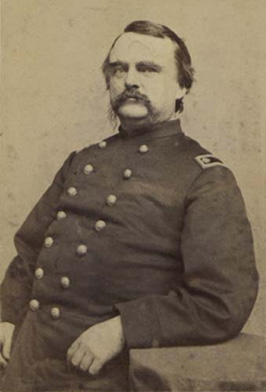
After we were put into Libby Dr. Whitney was not allowed to do anything for us. He was confined upstairs with other well prisoners. We were visited daily by a rebel doctor. He talked kindly but said he could do but little for us. He blamed our government because they would not send him medicine for the prisoners. He took considerable notice of me, I suppose because I had lost two limbs, and another comrade of our party by the name of Kelley who had his limb amputated by unjointing his hip, which at that time was a very rare operation.
[Pictured at right, Dr. Allston Waldo Whitney]
I told the rebel doctor that Dr. Whitney had performed the operation on both of us. On the morning of the third day after we were put into Libby, Mrs. Large and several of our party requested me to ask the rebel doctor if he would let Dr. Whitney come down to see us. As the rebel doctor appeared to take considerable notice of me and as I was the only man in the room that belonged to Dr. Whitney's regiment, they thought if I made the request it might be more readily granted.
When the rebel doctor made his next visit I asked him if he would let Dr. Whitney visit us. After some hesitation he said he would see what he could do. In the afternoon we were gratified by seeing the rebel doctor come into our room with Dr. Whitney. Both doctors examined some of the wounded who were there before we were put into the room, after which Dr. Whitney came over to my bunk and examined my wounds.
He cautioned me to be very
careful. He said many of the wounded were
afflicted with gangrene. If I got that poison into
my wounds it would kill me. After that I would not let the
rebel doctor or any one else except the young lieutenant from Iowa
touch my wounds.
I used to crawl over to the corner of the room where the water was running ten or twelve times a day and bathe my wounds and wash the bandages. I did not dare to use the bandages which the rebel doctor furnished, for I was afraid they would not be properly cleansed. I came out of Libby Prison with the same bandages on my wounds, that I went in with. In that way I kept the poison from my wounds. Mrs. Large treated her son the same way with like results.
...As time went on my appetite failed. I realized I was losing strength. It was more difficult for me to crawl over to the corner to obtain water to bathe my wounds. We all suffered much from the heat for the weather was very hot.
Most every day there were thunder-showers. Sometimes I succeeded in catching a little rain water in my tin cup and in that way obtained a drink of water that I could relish, but we had to be very careful for the guard that was pacing under our window was ordered to shoot any one caught leaning out of the window.
*******
Original version, concludes:
When we was first put into the prision we had three meals a day, but after the news came that Vixburg had surrendered they gave us but two. I learned from sick men that was brought in from Belle Island, that we had much better fare than they had there. The rebel surgeon used us very well, he used no insulting language to us nor alow any under him to, but he said he had but little medicine, and many a poor fellow died there that might have been saved if he had proper treatment and medicine.6
The rebel hospital stewerd also used us well and was very accommodating to us. He would go out into the market every day and buy any provision we wanted. By paying their prices which was follows. Butter four dollars a pound Sugar three dollars and a half Milk one dollar and a half a quart Bread two dollars a pound
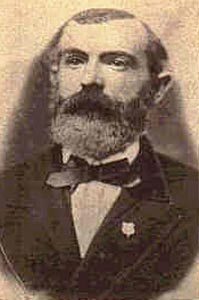 Blackberrys
seventy five cents a
quart and every thing in that proportion.
Blackberrys
seventy five cents a
quart and every thing in that proportion.
Lt Turner the officer in charge of the prision was very tyrannical to all the prisioners [he?] would alow no man to sit in the windows [or?] hold their heads out, and ordered the guard to shoot any man they caught violating his orders.
[Post-war image of Libby Prison Jailer, Lieutenant Richard Turner, right]
While I was there I talked with many of their officers and men, the rebel officers talked in their braggadocio and fire-eating style declairing that they never had been licked and never could be, that it was impossiable for the north to concor them, that they would gain their independence in two years. They compared their situation like our revolution of 1776. But their men when out of hearing of their officers would admit that their cause was hopeless, that they could not see any chance of gaining their Indipendance. Their money was nearly worthless and they was anxous to exchange it for Green backs at the rate of
Five dollars for one, I changed some at that rate and sent their money out to buy what I wanted as one dollar of their money [would?] buy as much as one dollar of ours, for the rebel authoritys would not alow the citizens to make any difference in the value. On the night of the 14th of July7 they paroled us and about three o’clock in the morning of the 15th they put us in coal wagons and carried us about a mile to the Petersburg depot and put us into baggage cars and started us for Petersburg Va which is thirty miles south of Richmond, we arrived there about ten o’clock and changed cars and started for City Point on the James river below Richmond when we arrived there our boat was waiting for us, we was soon put on board and was steaming down the river towards Fortress Monroe. We had a very plesant voige down the river and arrived at Fortress Monroe at dark. I was then carried down into the cabin and went to bed and had a good night rest.
We arrived at Annapolis Md. at noon the next day. We was taken from the boat and carried to St Johns College hospital where I remained until the 9th of Sept. When I was discharged and went up to Baltimore to get my pay. I remained ther until the morning of the 11th when I took the cars for New York. Arrived there that night which was Saturday.
I stoped at the soldiers rest in Howard St on Sunday and started Monday morning for home. I arrived in Marlboro that night after an absence of two years two months and ten days and minus one leg and one arm.
*******
The later version concludes:
Although I had been a prisoner but thirty-three days it seemed as though years had elapsed since I was captured. Soon I was carried on to the boat, where we were met by doctors and nurses with cups of hot genuine coffee. Soon after food was served to us under the doctor's directions, I found I had an appetite. The doctor would not let me have half as much food as I wanted. We were taken to Annapolis, Md., where we arrived July 19th. I was put into St. John's College Hospital. Mrs. Large was met at the steamer by friends from home. She bade me good-bye on the steamer and left with her son, who was carried to another hospital.
I have never seen either of them since. I rapidly gained strength with the kind and wholesome treatment I received, As soon as I was strong enough I was sent to my home in Marlboro where I arrived Oct. 25, 1863.
Pictured is the Marlboro, Massachusetts post-office building. The man standing in front with two canes is probably Post-Master John S. Fay. Fay was appointed to the office by President Andrew Johnson on June 8, 1865 and held the position until his death in 1914.
William G. Large, the Pennsylvania boy, survived his wounds and married Rebecca Tongue in Philadelphia, 1866. His bad leg wounds bothered him for the rest of his life. He was forced to give up work at a young age. He and his wife settled in Pleasontville, New Jersey, and lived off his meager pension until his death in 1913, leaving his widow and 2 sons.
1.
Fay is frequently given
the rank of Corporal at the time of his wound. Sometimes
promotions were post-dated. Roster's give him the rank of
Sergeant, dated to March, 1863.
2.
An
anecdote in Charles Roundy's memoirs recalling a post war re-union
quotes Fay saying Sgt. Enoch C. Pierce assisted him from the
field to the hospital.
3.
The hospital is
in the Henry Fitzhugh House, also known as
'Sherwood Forest.'
4.
In his latter
narrative, Fay tells the
story of Mrs. Large, who came to the Fitzhugh House Hospital
to nurse
her son, William, (90th PA) who was wounded severely, the same day as
Fay.
5.
This was almost certainly
Elizabeth Van Lew, a wealthy Union
sympathizer in Richmond, ostracized by the city's
entire population. She was known to send her
servants to assist
incoming Union prisoners for 'humanitarian reasons.'
She exhausted her fortune during the war helping the Union
cause.
6. John Wilkinson was the Surgeon in
charge of the Libby Prison Hospital until mid-1864.
7.
Latter version states they
were taken out of the prison July
16th. Medical case study of soldier James E. Kelly states the
14th as date of parole.
Medical Report of James E. Kelly
The following published medical report from the Surgeon General's Office, 1867, corraborates facts from Fay's story. It is the medical case study of soldier James E. Kelly, 56th PA. I add parts of it here as a footnote to Fay's memoir.
"A Report on amputations at the Hip-Joint In Military Surgery." Washington: Government Printing Office, 1867.
The next case is already well known to surgeons. It is satisfactory to record that the patient still lives and enjoys comfortable health. Letters are frequently received from him at this office complaining of the insufficiency of his pension, but rejoicing in his physical condition:
Private James E. Kelly. Co. B, 56th Pennsylvania Volunteers, aged twenty-eight years, was wounded at about nine o'clock of the morning of April 29 1863, in a skirmish of the First Division, First Corps, on the Rappahannock, nearly opposite Pratt's house, two miles below Fredericksburg. A conoidal musket ball, fired from a distance of about three hundred yards, entered the upper part of his left thigh in front, fractured the femur, and passed out at the posterior part of the thigh.Surgeon Edward Shippen, U.S. Volunteers, Surgeon-in-chief of the First Division, consulted the senior medical officers of the brigades attached to the division, and it was decided that in order to give the man a chance for his life amputation at the hip-joint should be performed. At four o'clock, seven hours after the reception of the injury, the patient was placed fully under the influence of chloroform, and Surgeon Shippen commenced the operation, assisted hy Surgeons G. W. New, A. W. Preston, Browne, and Murdock.
[The operation is described in detail; then:]
...The loss of blood was very slight, less even than in an ordinary amputation of the thigh. The stump having been dressed, the patient was placed in an hospital tent, and remained under Dr. Shippen's charge for three days. The operation was admirably borne, and the case was progressing most favorably on May 2d, when the patient was transferred to the Corps Hospital at the Fitzhugh House, under charge of Surgeon A. W. Whitney, 13th Massachusetts Volunteers, in consequence of the movement of the First Division to the battlefield of Chancellorsville. No unfavorable symptoms occurred. The patient improved daily, the stump granulating finely. He had an excellent appetite, and was quite content with the soldier's ration. But Dr. B. A. Clements, Assistant Medical Director and Dr. Taylor, Medical Inspector, visited him and provided that he should be furnished with such delicacies as the resources of the hospital could not supply. In the latter part of May, Surgeon Shippen having returned from Chancellorsville, saw the patient frequently and removed the ligatures until, on May 28th, the last had come away.
The case continued to progress favorably until June l5th, when the greater portion of the Army of the Potomac having moved northward, the wounded and sick at the Fitzhugh House were captured by the rebels. Kelly was taken to Fredericksburg in a wagon, and thence to Richmond by rail, and was incarcerated in Libby Prison. The extraordinary nature of his case appears not to have procured for him any modification of the amenities of that place of confinement. According to his report, he lay upon the floor on his blanket, and received a diet of diluted tea and corn bread, and twice a week a bowl of soup. He was not subjected to any surgical attendance. After a week of the prison regimen, the wound became gangrenous and a troublesome diarrhoea supervened. On July 14th, the prisoner was exchanged. He was sent to Annapolis, and entered the hospital there in an exhausted state. His normal weight before the removal of the limb was one hundred and fifty-five pounds, he now weighed sixty-three pounds. There was a sloughing sore extending from the upper outer angle of the wound downwards over a space larger than the hand. There was profuse diarrhoea.
...On August 19th, Acting Assistant Surgeon Stovell, who had immediate charge of the case, reported that the patient had steadily improved since his admission and might be considered out of danger. On September 17th, Surgeon T. A. McParlin, U.S.A., reported that Kelly was rapidly improving that the wound was healed, except at a point where there was a slight purulent discharge and over an ulcerated space as large as a walnut, which was granulating kindly. The patient had been removed to the tent colony or camp of convalescents. On December 23, 1863, the wound had entirely healed, and Kelly visited Washington and obtained his discharge from service and a pension of one hundred and eighty dollars a year. He then went to his home at Blairsville, near Black Lick post office, Indiana county, Pennsylvania. His general health was then good and his weight had increased to one hundred and twenty-four pounds.
© Bradley M. Forbush, October 19, 2013
Page Updated October 19, 2013.

